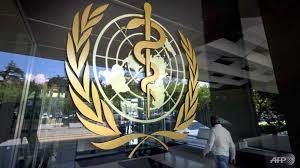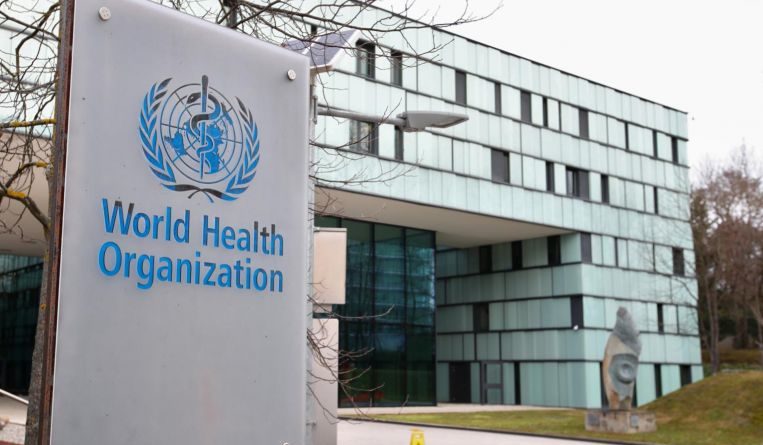COVID-19: “Te 2019 Plague-Day 148: WHO warns ‘long way to go’ in virus crisis, deaths top 180,000

GENEVA: The World Health Organization on Wednesday warned that the coronavirus crisis would not end any time soon, with many countries only in the early stages of the fight, as the global death toll surpassed 180,000.
The pandemic has sparked not only a health emergency, but a global economic rout, with businesses struggling to survive, millions left jobless, and millions more facing starvation.
US President Donald Trump — with an eye on widespread unemployment and his re-election prospects — prepared to sign an executive order suspending the issuance of green cards for 60 days.

Health experts in the world’s biggest economy warned it could face an even deadlier second coronavirus wave come winter, as some US states moved to reopen select businesses.
Nations around the world have been scrambling to fight the pandemic — which has killed more than 180,000 people and infected nearly 2.6 million worldwide — while desperately seeking ways to limit the devastating economic fallout.
As some countries have moved to lift lockdown restrictions that have upended daily life around the globe, WHO chief Tedros Adhanom Ghebreyesus issued a sober warning.
“Make no mistake: we have a long way to go. This virus will be with us for a long time,“ Tedros told a virtual press conference.

“Most countries are still in the early stages of their epidemics. And some that were affected early in the pandemic are now starting to see a resurgence in cases.”
Worst-hit region Europe saw its death toll climb to another grim milestone of 110,000, while fatalities in Italy, the hardest hit country behind the United States, topped 25,000.
Finland said it would maintain a ban on gatherings of more than 500 people through July.
In Spain, which reported a slight increase for the second day running in the number of COVID-19 deaths, the government said it did not expect to lift its strict lockdown until mid-May.
“We must be incredibly careful in this phase,“ Prime Minister Pedro Sanchez said.

– ‘Significant step’ –
But Germany, which has cautiously begun allowing shops to reopen, offered another glimmer of hope when it announced that human trials for a vaccine will start by next week.
The trial, only the fifth to have been authorised worldwide, is a “significant step” in making a vaccine “available as soon as possible”, the country’s regulatory body said.
With several months to go before a viable vaccine can be rolled out, more than half of humanity remains under some form of lockdown.
Singapore extended its confinement order for a month to June 1, as the Asian city-state — which managed to keep its outbreak in check early on — has been hit by second-wave infections.
The director of the US Centers for Disease Control also warned Americans to prepare for a more ferocious second round of outbreaks.
“There’s a possibility that the assault of the virus on our nation next winter will actually be even more difficult than the one we just went through,“ Robert Redfield told The Washington Post.
In South Africa, more than 73,000 extra troops were sent out to enforce a shutdown as authorities struggled to keep people indoors — particularly in overcrowded townships.
With businesses shuttered and millions of jobs lost, the UN’s World Food Programme (WFP) said the virus crisis would hit the least privileged the hardest.
“I want to stress that we are not only facing a global health pandemic, but also a global humanitarian catastrophe,“ WFP executive director David Beasley told the UN Security Council on Tuesday.
“Millions of civilians living in conflict-scarred nations… face being pushed to the brink of starvation.”
The WFP said the number of people suffering from acute hunger was projected to nearly double to 265 million this year.
Standing in line in Bangkok’s historic quarter for food donations of rice, noodles, milk and curry packets, Chare Kunwong, a 46-year-old masseur, said: “If I wait for the government’s aid, then I’ll be dead first.”

– ‘Wrong and unjust’ –
In the United States, Trump cast his decision to suspend the issuance of green cards as one to “help put unemployed Americans first in line for jobs as America reopens.”
“It would be wrong and unjust for Americans to be replaced with immigrant labor flown in from abroad,“ he said.
The US has recorded more than 46,000 deaths and more than 800,000 infections — and its health care infrastructure, especially in hotspots like New York, has struggled to cope.
Protesters took to the streets again Wednesday — this time in Virginia’s state capital Richmond — to demand that stay-at-home orders be lifted so people can get back to work.
But that demonstration came as experts revealed that the country’s first virus-related death came in February, weeks earlier than first reported.

– ‘Now they die alone’ –
Among those hardest hit economically during the crisis are millions of migrant workers who toil abroad to send money back home to their families.
Remittances are expected to plunge by about 20 percent globally this year, the biggest decline in recent history, the World Bank said in a report on the money transfers that are lifelines to millions of families.
The pandemic shutdowns mean even the bodies of some migrant workers cannot be sent home, and are instead being buried or cremated in the country where they die — often without any loved ones present.
“Nobody comes anymore, nobody touches, nobody says goodbye,“ said Ishwar Kumar, manager of a Hindu cremation ground in Dubai.
Before the pandemic, people would come “to grieve and bring flowers. Now they die alone”. – AFP
 WHO says: No direct link but climate change could affect response to pandemic
WHO says: No direct link but climate change could affect response to pandemic
SINGAPORE – The changing climate may not have directly caused Covid-19 or affected its spread, but the World Health Organisation (WHO) said on Wednesday (April 22) that climate change could be affecting the world’s response to the pandemic.
Climate change undermines environmental determinants of health, and places additional stress on health systems, said the WHO in a Q&A posted on its website.

AVAILABILITY OF WATER
Water, for example, is used for personal hygiene, medical care, drinking and food production.
But the availability of this resource could be affected by climate change, symptoms of which include erratic rainfall patterns and droughts.
The virus causing Covid-19 is thought to be mainly transmitted directly from person-to-person through close contact, or through respiratory droplets produced when an infected person coughs or sneezes.
“Physical distancing and washing hands are essential to breaking the chain of transmission, and are the most effective way to protect yourself, in all locations and all seasons of the year,” said the global health body.

While access to adequate and safe water and sanitation is essential for communities to practise basic hygiene and reduce transmission of Covid-19, one in four health care facilities around the world lacks basic water services, directly impacting over two billion people, it said.
“Around 80 per cent of the world’s population is already experiencing some level of water scarcity. Climate change further threatens the availability of water,” said the WHO.

AIR POLLUTION AND HEALTH
Air pollution is a serious health risk which kills about seven million people every year and is responsible for one third of all deaths from stroke, lung cancer and heart disease, said the WHO.

While global efforts to reduce the spread of Covid-19 has led to reduced economic activity and a respite in air pollution in some areas, these are short-term benefits that are “no substitute for planned and sustained action on air quality and climate”, said the WHO.

It cautioned that a rapid expansion of polluting economic activities once the measures have ended may lead to any reversals in environmental improvement, unless there is a clear focus to promote equity, environmental health, around a just transition to a green economy.
Separately, research is ongoing at Singapore’s Nanyang Technological University (NTU) to investigate the link between air quality and health outcomes for patients with Covid-19, a respiratory disease.
Professor Stephan Schuster, research director at NTU’s Singapore Centre for Environmental Life Sciences Engineering, is working with Assistant Professor Sanjay Chotirmall, from NTU’s Lee Kong Chian School of Medicine, to understand the role of the air microbiome (which includes tiny organisms such as bacteria and fungi) on the lung.
An earlier study that Prof Schuster supervised found that humans breathe in between 100,000 and one million microorganisms a day.
Typically, a healthy person would be able to clear these organisms through the body’s defence system.
But problems arise when the individual has a lung disease, such as asthma or chronic obstructive pulmonary disease, where these defences are compromised and the patients become more susceptible to infection and inhaled pollutants.
Prof Chotirmall said scientists are still at a preliminary stage of understanding the true role of the air microbiome on the lung .
He added: “We are actively researching this specific question by prospectively assessing the air microbiomes in the homes of patients with chronic respiratory illness and following their disease course.”
This work, said Prof Chotirmall is being done in collaboration with multiple different hospitals across Singapore through The Academic Respiratory Initiative for Pulmonary Health led by NTU’s Lee Kong Chian School of Medicine.

“The collaborative programme aims to align strategic academic expertise across Singapore in a formal way to benefit Singaporeans suffering with lung disease through research,” he told The Straits Times.

WILDLIFE, BIODIVERSITY AND INFECTIOUS DISEASES
The WHO also said that there is evidence that increasing human pressure on the natural environment may drive disease emergence.
“More generally, most emerging infectious diseases, and almost all recent pandemics, originate in wildlife, and there is evidence that increasing human pressure on the natural environment may drive disease emergence,” said the WHO.
Strengthening health systems, improved surveillance of infectious disease in wildlife, livestock and humans, as well as greater protection of biodiversity and the natural environment, should reduce the risks of future outbreaks of other new diseases, it added.
In an earlier interview with The Straits Times back in January, Professor Peter Piot, a Belgian microbiologist who co-discovered the Ebola virus, had cited dengue as an example of an infectious disease that could be affected by climate change.
“Mosquitoes that transmit dengue need a certain temperature,” he said. “Before, the mosquitoes could not survive in countries that are far from the equator. But now with climate change, they can..”
In 2009, a study published in the Nepal Health Research Council’s journal found the dengue-spreading Aedes aegypti mosquito in Kathmandu, Nepal’s capital, for the first time. Its authors pinpointed climate change as the major culprit.

LESSONS FOR CLIMATE CHANGE
The WHO said that the Covid-19 pandemic and climate change were two different threats.
“The Covid-19 pandemic is a public health emergency of international concern, which has claimed lives, and severely disrupted communities. Climate change is a gradually increasing stress that may be the defining public health threat of the 21st century,” it said.

But they offer similar learning points for the global community.
This includes ensuring access to the “environmental determinants of health” such as clean air, water and sanitation as well as safe and nutritious food. These are essential protection against all health risks, said the WHO, which also estimated that avoidable environmental risks cause about a quarter of the global health burden.
Other common lessons include taking early action to save lives, to reduce the toll on lives and economies, and tackling social and economic inequality, which often manifests in unequal health risks.
Said the WHO: “When faced with public health threats of a global scale, such as Covid-19 or climate change, we are only as strong as our weakest health system.”


SPACE RESERVE FOR ADVERTISEMENT
.
RELATED STORIES:
.

All photographs, news, editorials, opinions, information, data, others have been taken from the Internet ..aseanews.net | [email protected] | Fo r comments, Email to : Al Bulario










